February Theater Guide: More Shows Per Day
- Like
- Digg
- Del
- Tumblr
- VKontakte
- Buffer
- Love This
- Odnoklassniki
- Meneame
- Blogger
- Amazon
- Yahoo Mail
- Gmail
- AOL
- Newsvine
- HackerNews
- Evernote
- MySpace
- Mail.ru
- Viadeo
- Line
- Comments
- Yummly
- SMS
- Viber
- Telegram
- Subscribe
- Skype
- Facebook Messenger
- Kakao
- LiveJournal
- Yammer
- Edgar
- Fintel
- Mix
- Instapaper
- Copy Link
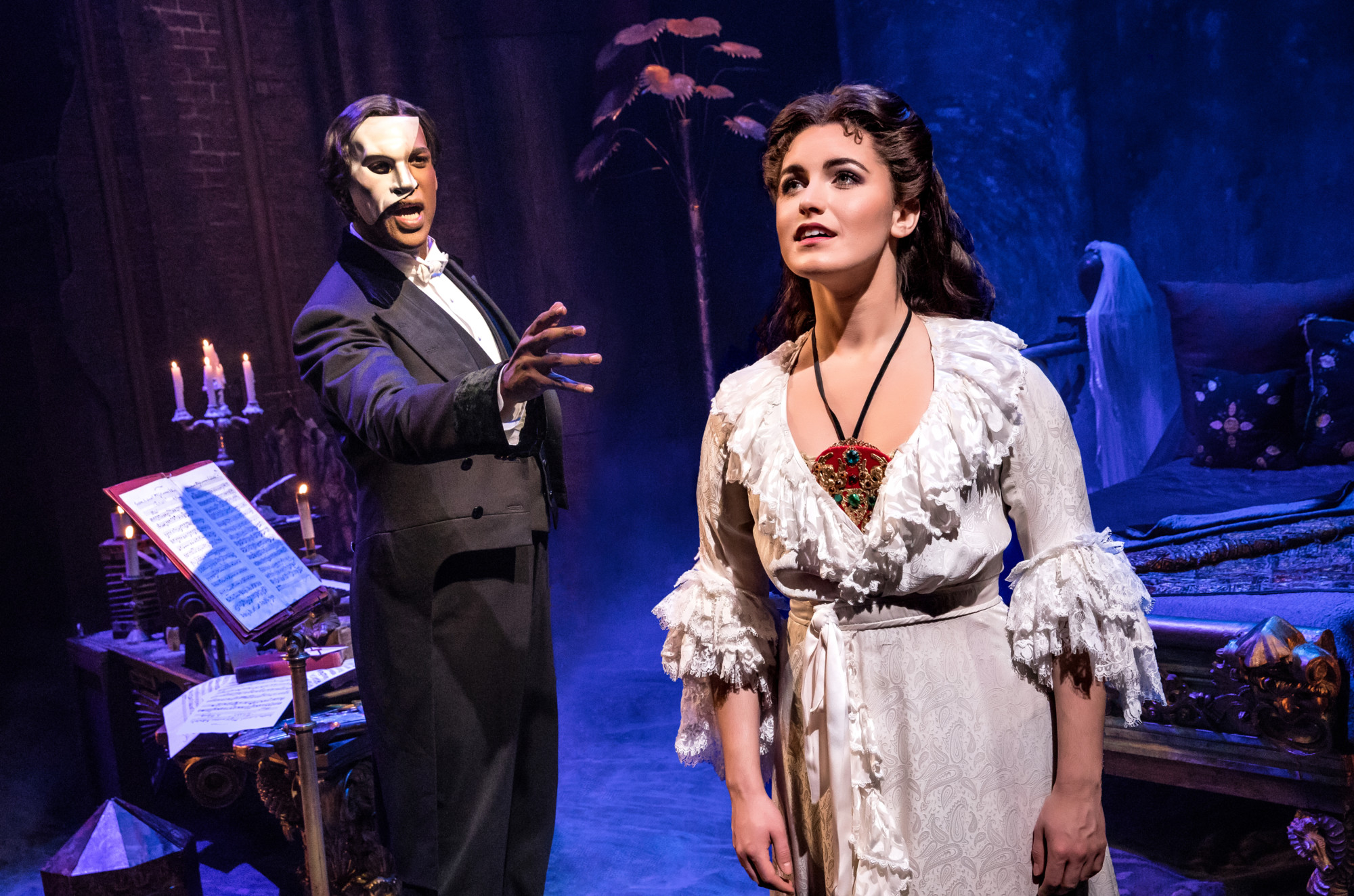
Eva Tavares is Christine and Quentin Oliver Lee is you-know-who in the new touring production of ‘The Phantom of the Opera,’ one of a multitude of multifarious shows on Pittsburgh stages in February. (photo: Matthew Murphy)
February is a peak time for live theater, and since it is also the shortest month, this translates to more shows per day than many Pittsburgh theatergoers may be used to. This monthly Theater Guide is intended to help you choose wisely.
As always, notable plays, musicals, dance performances, operas, and theatrical hybrids are all previewed under one cyber-roof. And each preview contains fascinating background info that you might not find unless you really go digging.
Some high-profile shows include Shakespeare’s The Tempest—performed by The Public with some unusual twists—and the latest touring production of The Phantom of the Opera. Quantum Theatre presents The Gun Show (Can We Talk About This?), E.M. Lewis’s much-talked-about play on the topic of guns, while the new Pittsburgh Playhouse hosts a world-premiere adaptation of Hemingway’s The Old Man and the Sea.
As for potential sleeper hits—i.e., plays that aren’t household names, though hardcore theater fans know of them—try An Octoroon by Branden Jacobs-Jenkins, at Kinetic Theatre. It’s a modern send-up of a racial melodrama popular in the 1800s. And given that February is Black History Month, there are more shows with African-American themes. They include Savior Samuel by Mark Clayton Southers (at Pittsburgh Playwrights) and Pearl Cleage’s Flyin’ West (Pitt Theatre Arts), plus touring productions of Lacresha Berry’s Tubman and the avant-garde dance/theater show Dapline!
Other acclaimed touring shows are Dan Ruth’s A Life Behind Bars (meaning the kind you drink in, not the prison kind); Susan Stein’s Etty, and an adaptation of C.S. Lewis’s The Screwtape Letters. Best one-night stand? That would be a one-night-only visit by the Paul Taylor Dance Company.
In noteworthy resident productions, Pittsburgh Ballet Theatre dances Jorden Morris’s The Great Gatsby, while Pittsburgh Opera stages two modern chamber operas with warlike themes: David Paul’s AfterWARds—Mozart’s Idomeneo Reimagined and Tom Cipullo’s Glory Denied.
There’s more. Shows are previewed in order of run dates, in three categories: Continuing from January, Spotlighted Shows for February, and Other Suggested Productions.
Continuing from January:
A LIFE BEHIND BARS (one-man show) by Dan Ruth. Jan. 31 – Feb. 2 at Carnegie Stage.

Don’t fall off that bar stool! Dan Ruth pushes the envelope in ‘A Life Behind Bars.’ (photo: Rolando Pellot)
A Life Behind Bars is not a prison drama. Theater artist Dan Ruth created this one-man play about his previous life tending bars and drinking in them. The real-life scenes that he re-enacts transpired over a couple of decades in New York City, where Ruth premiered the show in 2015, winning praise (and various awards) for both its dark-comic tales and how deftly he presents them. His subjects range from the surreal patrons he has served to the social evolution of Brooklyn, once an affordable haven in the pre-man-bun era and now Gentrification Central. In a sense, A Life Behind Bars is a panorama of New York life from the saloon perspective—but it’s also a story of altered consciousness gone wrong, as Ruth relates his own tainted love affair with intoxicating beverages. He’s been in recovery for a while and intends to show up sharp as a straight-edge razor when he performs A Life Behind Bars at Carnegie Stage. 25 W. Main St., Carnegie.
IN THE HEIGHTS (musical) by Lin-Manuel Miranda and Quiara Alegría Hudes. Through Feb. 3, Pittsburgh Musical Theater.
Pittsburgh Musical Theater, known for youth programs and family-friendly musicals, has branched into more adventurous fare with its West End Series. PMT’s latest is In the Heights, the 2008 Tony Award winner for Best Musical and Lin-Manuel Miranda’s first hit. This ensemble piece follows the adventures of young strivers in New York’s Washington Heights, a center for immigrants from the Dominican Republic and other Spanish-speaking countries. As in many immigrant neighborhoods, what a lot of folks strive for is to move on and up in the world—but the path isn’t always clear, and, as the show depicts, there’s plenty of drama right at home. Miranda (who’s not from the Heights but grew up in the New York metro area) wrote the first iteration of In the Heights while a student at Wesleyan University. After a student production scored well, he kept developing it. The Broadway version has major contributions from Quiara Alegria Hudes—credited as the book writer, and later a Pulitzer-winning playwright for Water by the Spoonful—and from New York director Thomas Kail. In PMT’s Gargaro Theater, 327 S. Main St., West End.
AFTERWARDS—MOZART’S IDOMENEO REIMAGINED (opera), adapted and directed by David Paul. Through Feb. 3, Pittsburgh Opera.

Everybody’s grabbing for the winning hand in ‘AfterWARds—Mozart’s Idomeneo Reimagined.’ The Pittsburgh Opera cast, L to R, is Caitlin Gotimer, Antonia Botti-Lodovico, Ashley Fabian, and Terrence Chin-Loy. (photo: David Bachman Photography)
Pittsburgh Opera premieres a streamlined version of an old epic with AfterWARds — Mozart’s Idomeneo Reimagined. First staged in 1781, Idomeneo was a major success for Mozart, richly displaying his musical brilliance. But it has become a problem child in the opera world. The libretto (by Giambattista Varesco) is long and clunky, and even with cuts that Mozart himself made, a full production can run about four hours. So Brooklyn-based opera director David Paul has done a “director’s cut” that hones the rambling saga down to an 80-minute psychodrama. Paul’s AfterWARds focuses on the passions and conflicts among the story’s four key characters, keeping all of Mozart’s music for the portions used.
The situation: Idomeneo, king of Crete, returns victorious from the bloody Trojan War—only to find, unhappily, that his son has rescued and loves a Trojan princess. Ominously nearby is Electra, the star-crossed woman of Greek mythology, who wants the young man for her own. Performing AfterWARds for Pittsburgh Opera are tenor Terrence Chin-Loy, mezzo-soprano Antonia Botti-Lodovico (in a trousers role as Idamante, the king’s son), and sopranos Ashley Fabian and Caitlin Gotimer. In Italian with English supertitles at the CAPA Theater, 111 9th St., Cultural District.
CHARLIE AND THE CHOCOLATE FACTORY (musical) by David Greig, Mark Shaiman, and Scott Wittman, from Roald Dahl’s book. Jan. 29 – Feb. 3, U.S. touring company at Benedum Center.

Charlie’s got a golden ticket—and Roald Dahl fans surely have tickets for the musical version of ‘Charlie and the Chocolate Factory.’ (photo courtesy of the touring company)
Who says the age of mythology is dead? There are modern stories that acquire the status of myths or fables, one of them being Roald Dahl’s Charlie and the Chocolate Factory. This spooky 1964 children’s book was written by a man of Norse descent, born in Wales, who’d been a heroic British fighter pilot in World War II—a fitting background for the author of a saga. Adults and youngsters alike have relished his dark-comic story of a supernatural candy maker, Willy Wonka, who rewards virtuous Charlie while naughty kiddos get mangled in the factory’s magical machinery. The story has been interpreted as a morality tale, a satire of our consumer culture, and more, and it has been re-told in various ways. The 1971 movie had Gene Wilder as a quirky, philosophical Wonka quoting Shakespeare. The 2005 movie had Johnny Depp as a creepy Wonka. And now there’s a stage musical!
The musical Charlie and the Chocolate Factory, which visits Pittsburgh on its U.S. tour, is an American-adapted version of the show that premiered to enthusiastic acclaim in London in 2013. Heartwarming songs include “Auf Wiedersehen, Augustus Gloop” and some from the ’71 movie, notably “The Candy Man” and “Pure Imagination.” Presented as part of the PNC Broadway in Pittsburgh series at Benedum Center, 237 7th St., Cultural District.
RUN THE RABBIT PATH by Ray Werner. Jan. 31 – Feb. 16, PICT Classic Theatre.
Young Pittsburghers may not know that Ray Werner was once a leading figure in the city’s advertising industry. After co-heading his own agency for a number of years, Werner returned to his lifelong interest in theater and is now one of the area’s best-known playwrights. His latest, Run the Rabbit Path, premieres at PICT Classic Theatre. It’s an Irish-American family drama in which two brothers and a sister are preparing to hold a wake. The deceased is their father, and the play’s title refers to “the mystery of the rabbit path”—which cannot be revealed or explained here, since nobody knows what it is except for Werner and those associated with the play. In the Fred Rogers Studio at WQED, 4802 Fifth Ave., Oakland.
THE TEMPEST by William Shakespeare, adapted by Marya Sea Kaminski. Through Feb. 24, Pittsburgh Public Theater.

What a crew: From the left, Shammen McCune is Caliban, Bethany Caputo is Stephano, and Jamie Agnello is Trinculo in ‘The Tempest’ at The Public. (photo: Michael Henninger)
The Tempest is one of Shakespeare’s strangest plays, and a new production at Pittsburgh Public Theater adds a further dimension. Shakespeare’s story: Prospero, an exiled duke, lives on a remote island, where he has acquired magical powers and dominion over enchanted creatures. He conjures a storm that drives ashore a ship carrying his disloyal brother—who had usurped him, to claim the dukedom—along with the brother’s posse. Prospero magically teases and torments them until they’ve had enough. Then, magnanimously, he forgives all who have wronged him. The Tempest mixes bizarre comedy with serious themes and exotic characters, creating a stew of sensations open to many interpretations. The version at The Public is adapted and directed by new artistic director Marya Sea Kaminski, who gives the play multiple twists.
Whereas the original has nearly all male characters, Kaminski’s cast has no men, with Pittsburgh native and noted TV actress Tamara Tunie starring as Prospero. The play begins in a modern-day hospital, where she is a cancer patient facing a grim prognosis. Worse, she’s distraught that her family has abandoned her at such a time. Then she slips into a dream, becoming Prospero on the island, and The Tempest unfolds from there. At the O’Reilly Theater, 621 Penn Ave., Cultural District.
WHERE DID WE SIT ON THE BUS? by Brian Quijada. Through Feb. 24, City Theatre.
Twenty-odd years ago, when Brian Quijada was in grade school, the teacher gave a history lesson that puzzled him. It was about civil rights activist Rosa Parks, who challenged the old Southern rule that made black people sit separate from whites on buses. Little Brian wanted to know What about us Latinos? Where did we sit? Today, Quijada is a theater artist. He’s won rave reviews in Chicago and New York for a one-man play inspired, he says, by that long-ago question. City Theatre brings Quijada to town for the Pittsburgh premiere of Where Did We Sit on the Bus?, a mixture of seriocomic storytelling and live music. Quijada’s stories cover subjects ranging from his parents’ chaotic immigration from El Salvador, during the country’s civil war, to his own wrangling with issues of both ethnic and personal identity. He is also a one-man hip-hop band, skilled at live-looping, beatboxing, rapping, and singing—all of which figure prominently in Where Did We Sit on the Bus? At City Theatre’s Lester Hamburg Studio, 1300 Bingham St., South Side.
Shows in the EC Spotlight for February
THE OLD MAN AND THE SEA by A.E. Hotchner and Tim Hotchner, from Ernest Hemingway’s novella. Jan. 31 – Feb. 17, Pittsburgh Playhouse with RWS Entertainment.
In a world premiere at Pittsburgh Playhouse, Ernest Hemingway’s The Old Man and the Sea becomes a theater production that you might call “The Old Man and the Play.” Writer A.E. Hotchner, a friend of the late Hemingway and now 101, took charge of adapting the novella for the stage. (Hotchner’s son Tim, also a writer, assisted.) The play hews closely to Hemingway’s spare but symbol-laden plot. An old Cuban fisherman, scorned by neighbors for losing his mojo, goes out to sea to prove them wrong. He battles and reels in a huge marlin. Then, with the prize lashed aside his small boat, he must battle the sharks that come swarming for their shares. The play uses multimedia to help simulate the action. It also marks a new mode of collaboration, as Point Park University, owner of the Playhouse, teamed with RWS Entertainment of New York to produce it. More professional productions with other partners are planned. Anthony Crivello plays the fisherman in The Old Man and the Sea, and Playhouse Artistic Director Ronald Allan-Lindblom directs. In the Highmark Theatre at Pittsburgh Playhouse, 350 Forbes Ave., Downtown.
ETTY by Susan Stein. Feb.7-10, off the WALL productions.
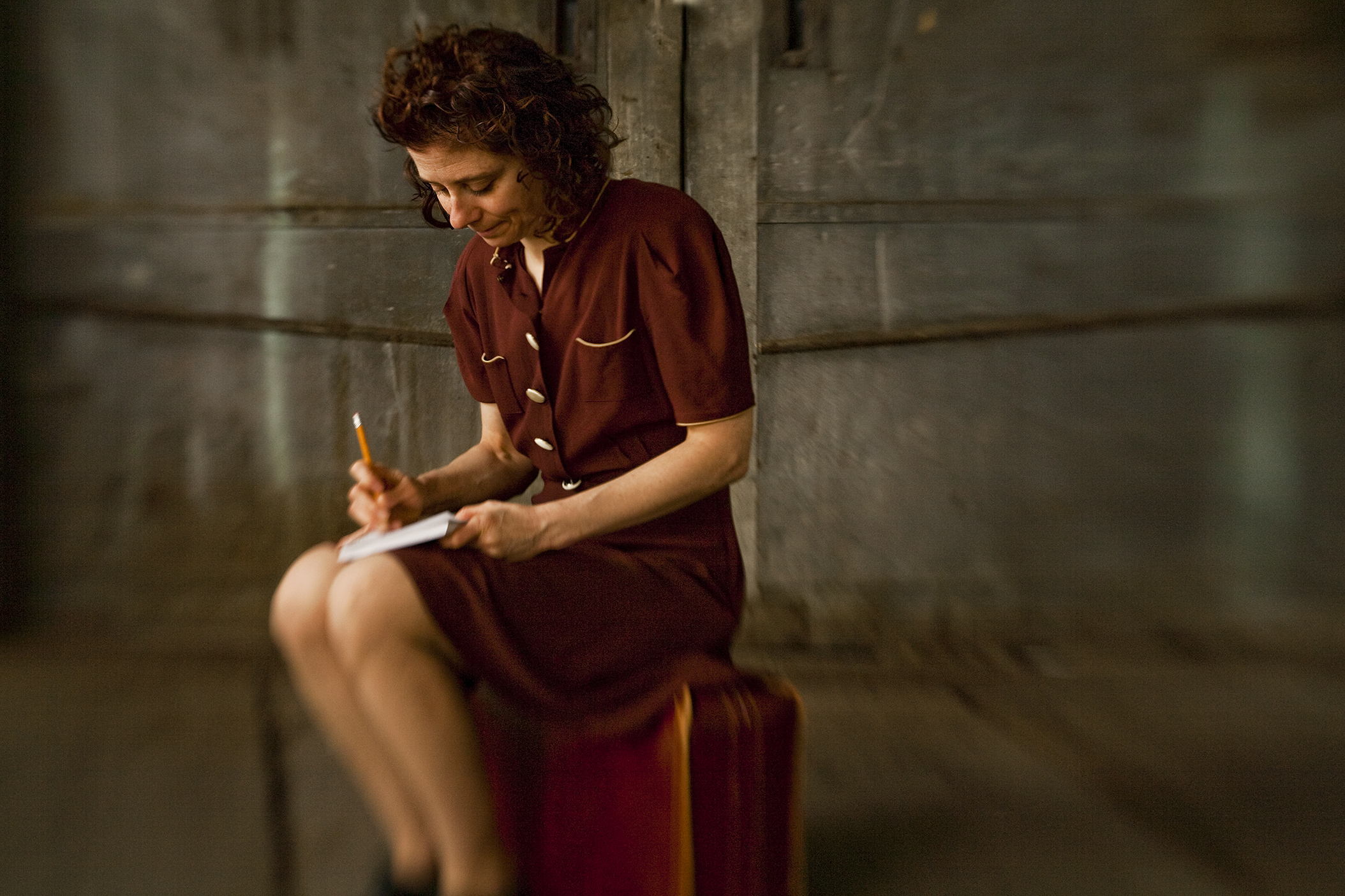
Susan Stein plays the diarist and Holocaust victim Etty Hillesum in ‘Etty.’ (photo: Ricardo Barros)
Etty, a one-person play by New York theater artist Susan Stein, re-creates the story of a remarkable woman who has been called an adult counterpart to Anne Frank. Esther “Etty” Hillesum was, like Frank, Jewish and living in Amsterdam when the Nazis invaded. She too kept a diary that was later published, in book form, after her death in a concentration camp. But the parallels end there. During the Nazi occupation, Etty Hillesum never went into hiding. She was in her twenties at the time, highly educated and keenly inquisitive. Her writings reflect a young woman living a full and somewhat chaotic life, while searching earnestly for a spiritual grounding and her rightful place in the world—a search greatly complicated by the terrors she witnessed, as the campaign to eliminate the Jews closed in around her. Stein’s play, drawn from Etty’s diary and letters she wrote, is said to be profoundly moving. Off the WALL productions presents Stein performing Etty at Carnegie Stage, 25 W. Main St., Carnegie.
THE GREAT GATSBY (ballet) by Jorden Morris. Feb. 8-17, Pittsburgh Ballet Theatre.
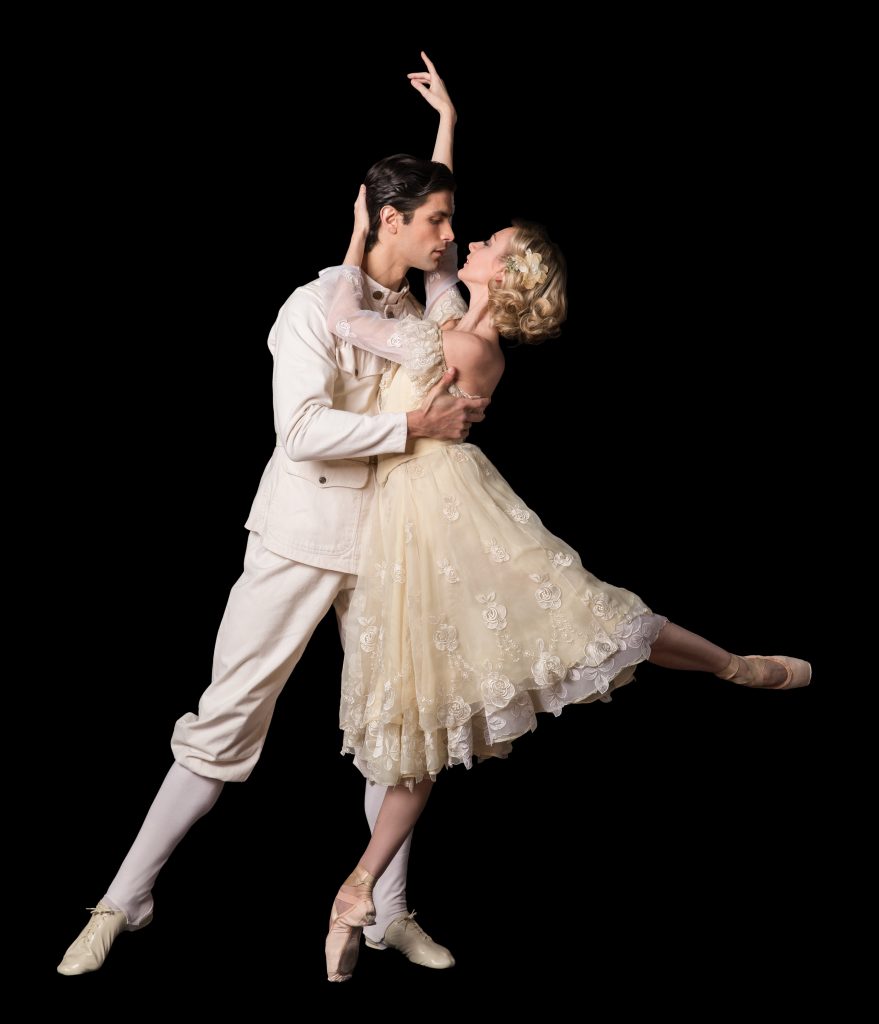
Alejandro Diaz and Hannah Carter dance a romantic scene from Pittsburgh Ballet Theatre’s ‘The Great Gatsby.’ (photo: Duane Rieder)
You read it in school; now see the ballet. East Egg, West Egg, Roaring Twenties angst, and adultery aplenty all come to life as Pittsburgh Ballet Theatre dances The Great Gatsby. F. Scott Fitzgerald’s novel has been adapted many times in multiple media, notably in the 2013 Baz Luhrmann film with Leonardo DiCaprio as Jay Gatsby, the glamorous millionaire in love with a woman married to man who runs around with other women. It’s a story of idealism and excess dissolving into tragedy—which seems to be a recurring pattern of Western civilization—and, since the theme is embodied in personal drama, it also lends itself to dance. The Great Gatsby has been made into more than one ballet. This one is choreographed by Canadian dance artist Jorden Morris, familiar to PBT audiences for his previous ballets Peter Pan and Moulin Rouge. Music by composer Carl Davis, played by the PBT Orchestra. Attendees can expect a Jazz Age aura and are not required to write term papers. Benedum Center, 237 7th St., Cultural District.
THE GUN SHOW (CAN WE TALK ABOUT THIS?) by E.M. Lewis. Feb. 8 – March 3, Quantum Theatre.
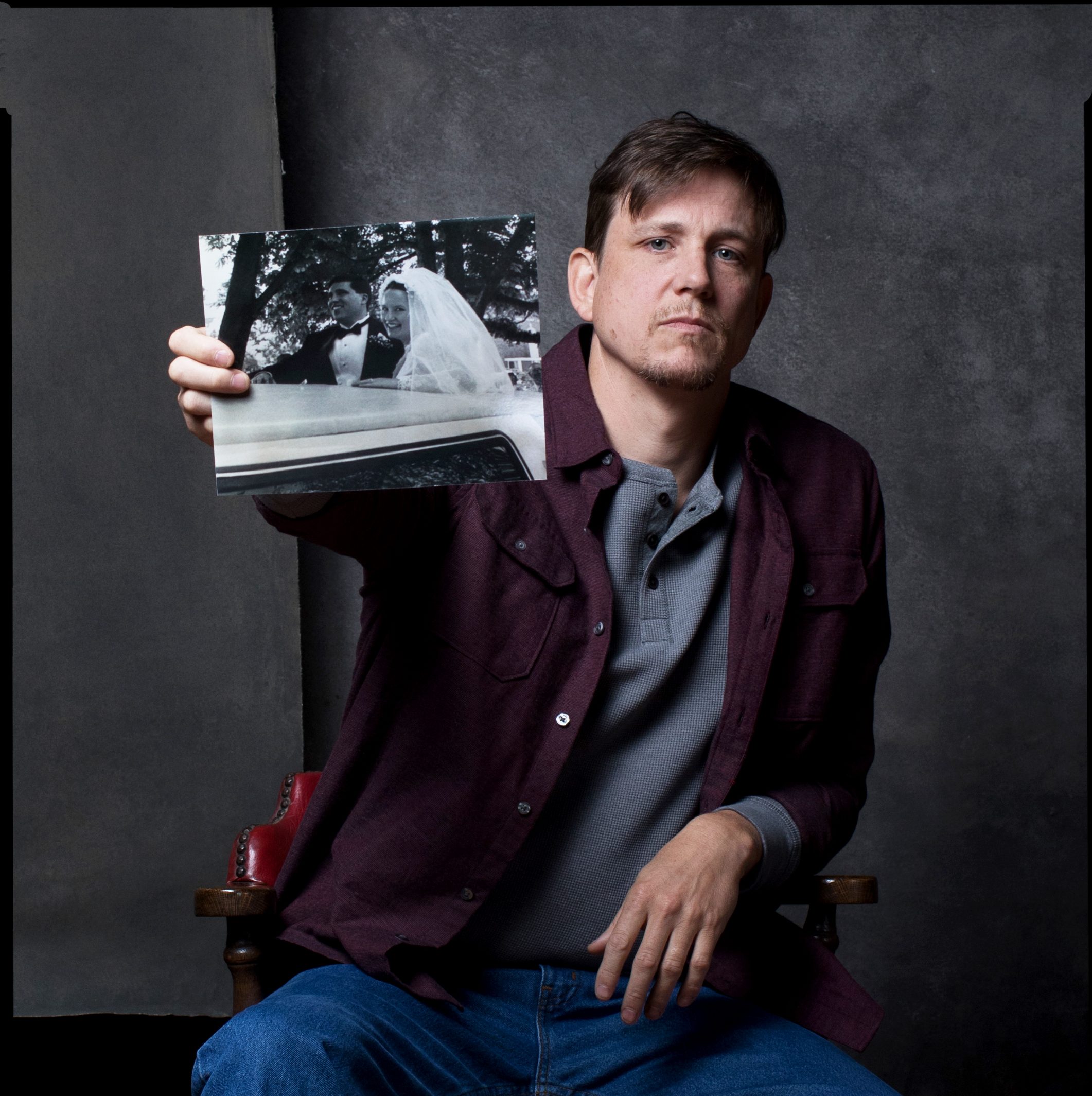
Andrew William Smith portrays playwright E.M. Lewis in Lewis’s ‘The Gun Show.’ (photo: Jason Snyder)
Is it a one-man or one-woman play? Actually, The Gun Show (Can We Talk About This?) is both. Playwright E.M. Lewis wrote it about her experiences with guns and her feelings toward them. But she specifies that the play be performed by a man pretending to read her words from a script. The device brings contrasting voices together, which is the purpose of the play generally. Lewis grew up around firearms in rural Oregon and appreciates their uses, but also knows the dangers of gun violence. She says gun issues have become so polarizing that “the commentary is killing the conversation” we need to have, and The Gun Show is meant to take a more nuanced look. The play has been staged in various cities since its 2014 premiere in Chicago. Quantum Theatre presents The Gun Show here, performed by Andrew William Smith and directed by Sheila McKenna. The run is split among three locations, with audience talkbacks after every performance: Feb. 8-17 in the Carnegie Library branch at 7101 Hamilton Ave., Homewood; Feb. 20-24 at CCAC’s West Hall, 808 Ridge Ave., North Side; and Feb. 27-March 3 at The Tull Family Theater, 418 Walnut St., Sewickley.
SAVIOR SAMUEL by Mark Clayton Southers. Feb. 8 – March 16, Pittsburgh Playwrights Theatre Co.
Pittsburgh Playwrights Theatre Company presents a new play by Mark Clayton Southers, the company’s founder and artistic director. Savior Samuel is a tale with spiritual (and perhaps supernatural) overtones, revolving around a family of African-American homesteaders in the Midwest during the 1870s. It’s the second recent play by Southers that deals with African Americans in the 19th century. His previous, Miss Julie, Clarissa and John, was a sly re-working of August Strindberg’s Miss Julie. Critics and audiences loved that one, so expectations are high for Savior Samuel. The cast includes Wali Jamal, Cheryl El-Walker, Jonathan Berry, and others. In the Trust Arts Education Center, 805 Liberty Ave., Cultural District.
FLYIN’ WEST by Pearl Cleage. Feb. 14-24, Pitt Department of Theatre Arts.
In the years after the Civil War, when many emancipated slaves migrated to northern cities, some went west. One group trekked to the plains of Kansas, where they started a town called Nicodemus. It was meant to be the hub of a new frontier: a place run by and for African Americans, drawing former field hands to establish their own farms on the wide-open lands nearby. Nicodemus became the town that wouldn’t die—struggling, sometimes flourishing, and eventually dwindling, but never going lights-out. Though only a handful of people now live there, the town is a National Historic Site and hosts an annual festival. Meanwhile, the founding pioneers have received pop culture’s highest honor. They’ve been fictionalized and dramatized. The play Flyin’ West, by Atlanta-based writer Pearl Cleage, is a boisterous number set in the turbulent early days of Nicodemus. Among other things, Cleage’s play depicts the women flyin’ at the men for equal standing. And why not? Pitt’s Department of Theatre Arts stages Flyin’ West in the Henry Heymann Theatre at the Stephen Foster Memorial, 4301 Forbes Ave., Oakland.
THE LEGEND OF GEORGIA MCBRIDE by Matthew Lopez. Feb. 14 – March 9, barebones productions.
Playwright Matthew Lopez is known for sensitive, nuanced treatments of LGBTQ and racial/ethnic themes. There are times, however, when one must say “Screw the nuance, let’s go for laughs,” and therefore Lopez wrote The Legend of Georgia McBride. It’s set in a seedy bar in the Florida panhandle. The bar’s Elvis impersonator is failing to draw crowds, so the owner replaces him with a couple of drag queens. When one of them can’t make a gig, the former fake Elvis is pressed into action, and presto—a legend is born. The Legend of Georgia McBride made its New York debut in 2015. A critic for the Times found it more fun than “RuPaul’s Drag Race,” which is high praise, if one can believe an allegedly failing newspaper. Pittsburgh theater fans will see the theory tested. Barebones productions presents The Legend of Georgia McBride with actors Andrew Swackhamer, Shua Potter, Justin Lonesome, and Sara Williams. In the barebones black box at 1211 Braddock Ave., Braddock.
AN OCTOROON by Branden Jacobs-Jenkins, from Dion Boucicault’s play. Feb. 15-24, Kinetic Theatre.

What is actor Ananias J. Dixon up to? Unusual doings abound in Kinetic’s dark comedy ‘An Octoroon.’ (photo courtesy of the artist)
Once upon a time—this is true—a man named Dion Boucicault was heralded as the greatest playwright of the 1800s. He was an Irishman of half-French (or at least part-French) ancestry; thus the name—although he may have been actually the son of his Irish mother’s Irish boarder. Boucicault wrote steamy, crowd-pleasing melodramas. His 1859 potboiler The Octoroon—popular among anti-slavery folks in America—was about a white Southern plantation owner in love with an octoroon (one-eighth African) woman, while a snarly villain plotted to seize the plantation and have the woman as his slave. Fast-forward to Brooklyn in 2014. African-American playwright Branden Jacobs-Jenkins premieres his play An Octoroon, a wild work of meta-theater. An Octoroon re-runs the plot of The Octoroon, turning it into an over-the-top but self-interrogating dark comedy that features both playwrights, Boucicault and Jacobs-Jenkins, as characters, fighting over the script. Controversially, actors in blackface, whiteface, and red face (for a Native American character) are used. An Octoroon has been hailed as an important statement on race, though it’s hard to say what the statement is, which may be intentional. Pittsburgh’s Kinetic Theatre performs An Octoroon with a cast including Ananias J. Dixon, Martin Giles, and others. At the New Hazlett Theater, 6 Allegheny Square East, North Side.
THE SCREWTAPE LETTERS by Jeffrey Fiske and Max MacLean, from C.S. Lewis’s novella. Feb. 16 only, 4 p.m., touring production at the Byham Theater.
C.S. Lewis, author of The Chronicles of Narnia, wrote another iconic fantasy that’s quite different. Pittsburghers can see a stage adaptation of The Screwtape Letters, his adult-themed, dark-comic satire. Screwtape is a senior demon in the bureaucracy of Hell. He has a nephew named Wormwood, who’s trying to corrupt a young man in London and thereby send the man’s soul to the Bad Place. But despite Uncle Screwtape’s expert advice, Wormwood keeps screwing it up, as he can’t figure out how to outfox the forces of good. Lewis dedicated The Screwtape Letters to his close friend J.R.R. Tolkein. Written and set during the Blitz in World War II, when Nazi aircraft were trying to bomb the British into submission, the story had an allegorical meaning at the time. It’s still popular for its keen insights into human nature, and for delivering a Christian-inspired moral message in an edgy rather than preachy form. The stage version currently touring the U.S. is by Jeffrey Fiske and Max McLean. Critics have called it a memorable Screwtape. 4 p.m. Byham Theater, 101 6th St., Cultural District.
THE PHANTOM OF THE OPERA (musical) by Andrew Lloyd Webber, Charles Hart, and Richard Stilgoe. Feb. 20 – March 3, touring company at Benedum Center.
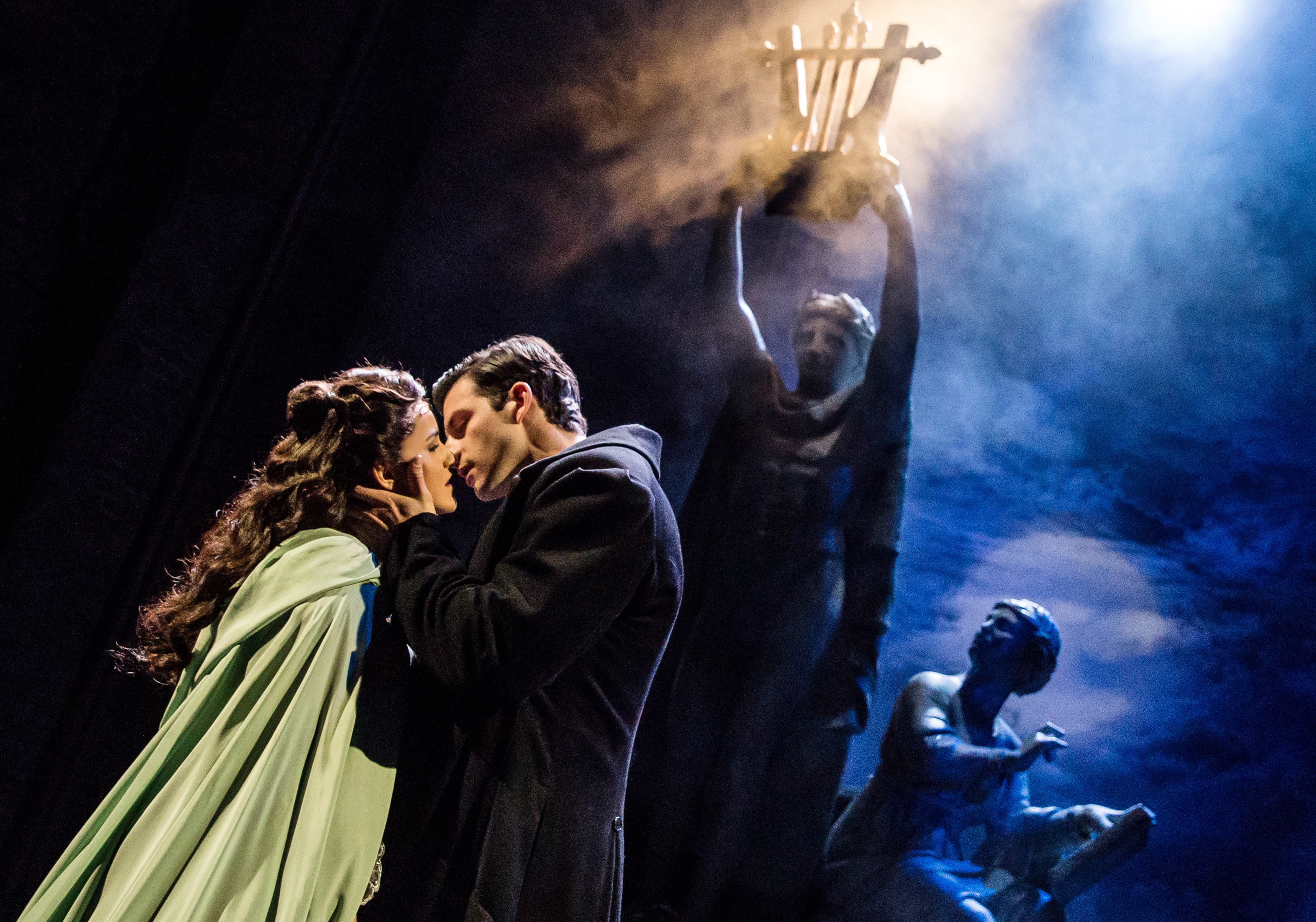
You want spooky effects, you got ’em, in the new ‘Phantom of the Opera’ that visits Pittsburgh. (photo: Matthew Murphy)
We’ve had the sequel; now we get the original. Last winter, Pittsburgh hosted a touring production of Love Never Dies, the long-awaited and not exactly universally praised sequel to a certain phantom’s adventures. This year we are visited by The Phantom of the Opera itself. Andrew Lloyd Webber’s 1986 mega-hit is still playing in New York and London, having set the Broadway record for longest continuous run by a musical while closing in on the London/West End record held by Les Miz. That’s plenty of credentials for a show that dramatizes a tale about a spooky opera-house legend, and that many deem equal to high opera in musical quality—but a new tour of any show has to promise something new, so here are quotes from the promo material: This production has “brilliant new scenic design” and “many exciting special effects,” making The Phantom of the Opera “bigger and better than ever before.” Lauded young baritone Quentin Oliver Lee plays the title role. Canadian soprano and dance artist Eva Tavares is Christine. Part of the PNC Broadway in Pittsburgh series at Benedum Center, 237 7th St., Cultural District.
CABARET (musical) by John Kander, Fred Ebb, and Joe Masteroff. Feb. 21 – March 2, Carnegie Mellon School of Drama.
Cabaret is not a rock musical, but it officially rocks. A Rolling Stone readers’ poll in 2016 ranked it one of the 10 best musicals ever. Set in Germany amid the Nazi takeover between the World Wars, Cabaret is a story of people trying to party or at least lead normal lives while their society goes nuts. It has everything from great songs to ironic humor to gripping drama, and every production seems to bring out new dimensions of this 1967 Tony Award winner. The 1972 movie featured an ultra-chilling rendition of “Tomorrow Belongs to Me.” Multiple stage revivals starred Alan Cumming as the ultra-kinky Emcee of the Kit Kat Klub. And now Carnegie Mellon School of Drama performs Cabaret, to celebrate today’s society going nuts in its own unique ways. Music by John Kander, lyrics by Fred Ebb, book by Joe Masteroff. In the Philip Chosky Theater on Carnegie Mellon’s campus, 4000 Forbes Ave., Oakland.
VINEGAR TOM by Caryl Churchill. Feb. 21 – March 10, Point Park Conservatory Theatre.
When Caryl Churchill turned 80 last year, articles in the British press paid tribute to her status as the grand dame of feminist theater and one of the most unconventional, “unpredictable” modern playwrights. Her plays vary in subject matter and style, many of them shape-shifting as they unfold. Here in Pittsburgh, Point Park Conservatory Theatre pays tribute by staging Churchill’s Vinegar Tom. The subject is persecution of alleged witches in England during the 1600s. In that respect the play is similar to Arthur Miller’s The Crucible—if you can imagine a Crucible with sex scenes, execution scenes, and raunchy songs. Various women are accused of causing everything that goes wrong in a small village. The only common thread is that all the suspected culprits are women, since women are seen as inherently wicked. And Vinegar Tom? He’s a black cat who just might be, or symbolize, the real villain. In the Rauh Theatre at the new Pittsburgh Playhouse, 350 Forbes Ave., Downtown.
PAUL TAYLOR DANCE COMPANY (modern dance). Feb. 23 only, 8 p.m. Presented by Pittsburgh Dance Council.
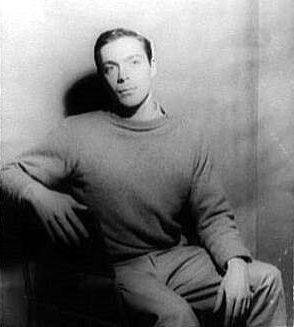
Paul Taylor was athletic, eclectic, and a heck of a choreographer. (photo: Carl Van Vechten, 1960)
Calling a great event a “must-see” doesn’t work—people have heard the cliché so often they no longer believe it—so let’s stick to facts. The Paul Taylor Dance Company is visiting Pittsburgh. Paul Taylor himself, a world-renowned figure in modern dance, died last summer, at 88. The company is dancing a program that showcases the range of works he created. And there aren’t many ranges like it. Taylor, born in Wilkinsburg but raised mostly in the Washington, D.C. area, had highly eclectic interests and ideas combined with a maverick personality and serious choreographic chops. His bizarre “3 Epitaphs” comes across like a daffy dream sequence from a noir sci-fi fantasy. In “Promethean Fire,” the entire troupe mixes simple movements with acrobatics to generate rippling, swirling patterns on stage. “Company B” is set to the bouncy World War II-era pop tunes of the Andrews Sisters, but includes chilling wartime imagery—such as silhouetted soldiers fighting and dying in the background while a happy home-front couple dances to the “Pennsylvania Polka.” The diverse program includes more. Byham Theater, 101 6th St., Cultural District.
GLORY DENIED (opera) by Tom Cipullo, from Tom Philpott’s book. Feb. 23 – March 3, Pittsburgh Opera.
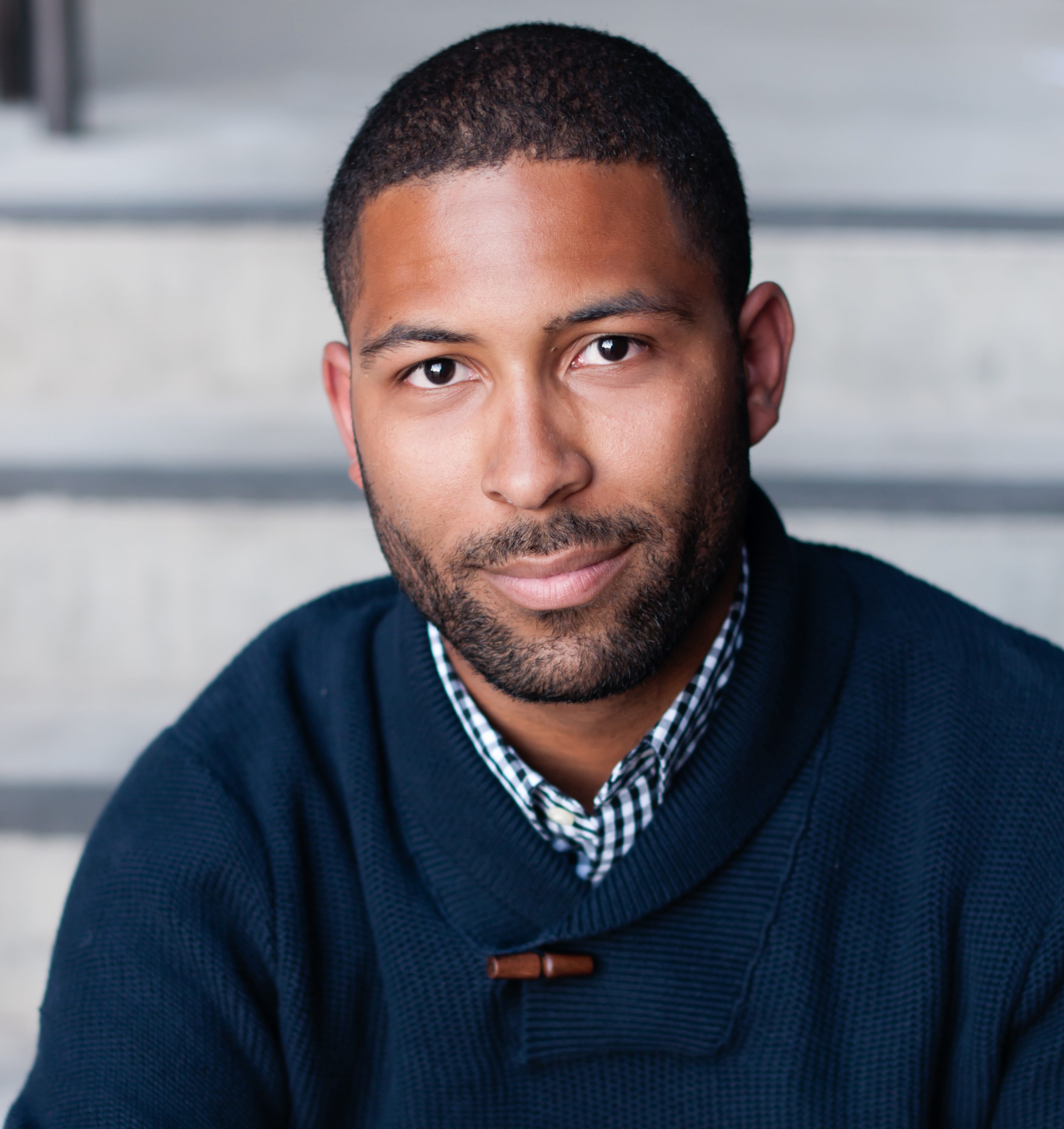
Baritone Benjamin Taylor sings the role of a distraught Vietnam veteran in ‘Glory Denied’ at Pittsburgh Opera. (photo courtesy of the artist)
Pittsburgh Opera presents a modern chamber opera based on a wrenching true story. Tom Cipullo’s Glory Denied dramatizes the wartime and homecoming ordeals of U.S. Army Colonel Jim Thompson, America’s longest-held prisoner of war. Thompson, a career officer, went to Vietnam just as U.S. involvement there was escalating. Captured in 1964, he survived nine grueling years in prison camps. Released in 1973, he returned home to find his wife and children living with another man—they had thought Thompson was dead—and an American society so changed that it felt foreign to him. Glory Denied is drawn from a nonfiction book of the same title by Tom Philpott. The opera uses an unusual device: Two singers play “young” Col. Thompson and his wife Alyce, as they lived until and during the soldier’s POW years, and two others play the older postwar couple, with all four interacting. Pittsburgh Opera has tenor Terrence Chin-Loy and soprano Ashley Fabian as the younger couple, joined by baritone Benjamin Taylor and soprano Caitlin Gotimer. At Pittsburgh Opera Headquarters, 2425 Liberty Ave., Strip District.
A Long-Running Show:
THE DOUBLE-THREAT TRIO (cabaret musical) by Adam Overett. Feb. 15 – April 28, Pittsburgh CLO Cabaret.
In the old days of football, before players specialized, a “triple-threat” man was somebody who could run, pass, and kick with the best. The term got borrowed for musical theater, where a top performer must be good at singing, dancing, and acting. A few years ago, off-Broadway composer Adam Overett wrote a comical song about a singer who can’t act. When done with appropriate ineptitude, it’s hilarious—and Overett has now spun the idea into a feature-length musical comedy. Pittsburgh CLO presents the world premiere of The Double-Threat Trio. The story concerns three friends eager to make it in show biz. Their problem is that each is sorely deficient in one of the three skills required. Playing The Double-Threat Trio for CLO are J. Alex Noble, Jerreme Rodriguez, and Drew Leigh Williams. (And BTW, they’re all in fact triple-talented, as they must be. You’ve got to be good to do a good job of pretending to do something badly.) At the Greer Cabaret Theater, 655 Penn Ave., Cultural District.
Other Suggested Productions:
DAPLINE! (dance/theater) by André M. Zachery and LaMont Hamilton. Feb. 1 only, 8 p.m., touring company at the August Wilson Center. Do you give daps? I.e., do you greet your pals with ritual handshakes, body-shakes, high/low fives, fist-bumps and/or et cetera? Whatever the answer, you may wish to catch the Pittsburgh performance of Dapline! It’s a dance-and-theater piece in which six men explore intriguing variations of the dap, while acting out silent vignettes that suggest deeper social implications. Created by André M. Zachery of Brooklyn’s Renegade Performance Group and indie artist LaMont Hamilton, Dapline! has been well received in New York. Fans of the show give it two thumbs up—and then some. 8 p.m. August Wilson Center, 980 Liberty Ave., Cultural District.
YOU CAN CALL ME AL (one-person show) by Ali Hoefnagel. Feb. 7-8 at the New Hazlett. The artist describes this original theater piece as “a long-form story about growing up, getting gay, coming out, living with mental illness, and uncovering family secrets.” Hoefnagel presents it as part of the Community Supported Performance Arts series at the New Hazlett Theater, 6 Allegheny Square East, North Side.
RUN FOR YOUR WIFE by Ray Cooney. Feb. 7-9, Greensburg Civic Theatre. Nothing in show business may match the twin achievements of Ray Cooney’s Run for Your Wife. The 1983 stage comedy was a huge hit, playing in London’s West End for nine years. Then the movie—made much later; released in 2013—became one of history’s great film flops. (Critics’ comments included “as funny as leprosy” and “worst British film ever.”) Greensburg Civic Theatre is banking on a live revival. The group stages Run for Your Wife at 951 Old Salem Rd., Greensburg.
BONNIE & CLYDE (musical) by Frank Wildhorn, Don Black, and Ivan Menchell. Feb. 8-16, Split Stage Productions.
Split Stage Productions, dedicated to staging adventurous musicals in Westmoreland County, roars into 2019 with a rip-roarer. Bonnie & Clyde is based on the true story of the young Depression-era couple who fell madly in love, and then let their small-time crime spree grow ever more madly murderous. Songs include “This World Will Remember Us” and “Too Late to Turn Back Now.” Bonnie & Clyde had only a short run on Broadway but has been popular in regional theaters and internationally; a recent Czech production was big in Prague. Split Stage presents the show at The Lamp Theatre, 222 Main St., Irwin.
TUBMAN (one-person show) by Lacresha Berry. Feb. 20-21 at the August Wilson Center.
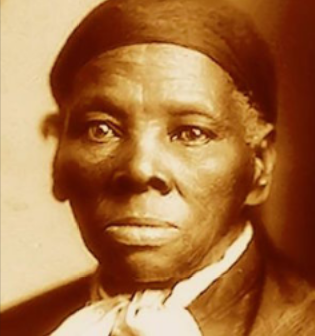
Harriet Tubman meant business. This photo is undated; the new play ‘Tubman’ imagines her in the present.
Harriet Tubman had powers that seemed otherworldly. Escaping from slavery in the antebellum South, she returned to lead many more daring escapes—outwitting pursuers, defying the odds, crediting her success to divine guidance. In the Civil War, she co-led a Union Army raid that liberated entire plantations. Now there is a one-woman play that literally places her in another world. Tubman, by Lacresha Berry, imagines the 1800s heroine in today’s Harlem, asking how she’d respond to current racial issues. Berry, a New York theater artist, performs Tubman at the August Wilson Center, 980 Liberty Ave., Cultural District.
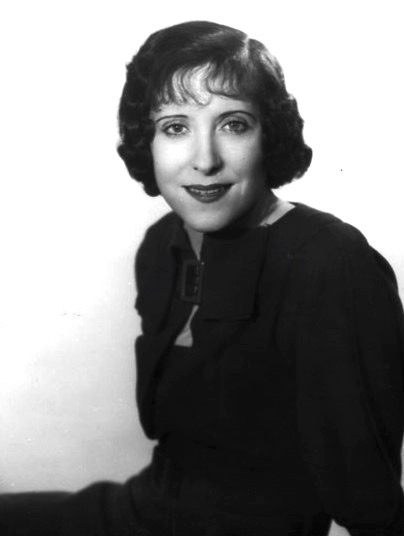
Gracie Allen has a historic role in Rachel Karp’s ‘It’s in the Bag.’ (photo, undated, CBS Radio)
IT’S IN THE BAG by Rachel Karp, from historical records. Feb. 20-23, Carnegie Mellon School of Drama.
Comedian Gracie Allen, long known as America’s funniest woman, ran for President in 1940. The campaign was a joke, of course—Allen ran on the Surprise Party platform; her slogan was “It’s in the bag”—but Harvard University endorsed her, she spoke at rallies across the country, and one outcome was a national convention of women voters and organizers. Rachel Karp’s play It’s in the Bag mixes episodes from the Allen campaign with stories of women who have seriously aspired to the land’s highest office. Karp, a theater artist focused on political and public-issue themes, is currently a directing fellow at Carnegie Mellon. The play is in the Helen Wayne Rauh Studio Theater on campus, 4000 Forbes Ave., Oakland.
Mike Vargo, a Pittsburgh-based freelance writer, covers theater for Entertainment Central.
Share on Social Media
- Like
- Digg
- Del
- Tumblr
- VKontakte
- Buffer
- Love This
- Odnoklassniki
- Meneame
- Blogger
- Amazon
- Yahoo Mail
- Gmail
- AOL
- Newsvine
- HackerNews
- Evernote
- MySpace
- Mail.ru
- Viadeo
- Line
- Comments
- Yummly
- SMS
- Viber
- Telegram
- Subscribe
- Skype
- Facebook Messenger
- Kakao
- LiveJournal
- Yammer
- Edgar
- Fintel
- Mix
- Instapaper
- Copy Link
Follow Entertainment Central
Sign up for the EC Newsletter
Latest Stories







